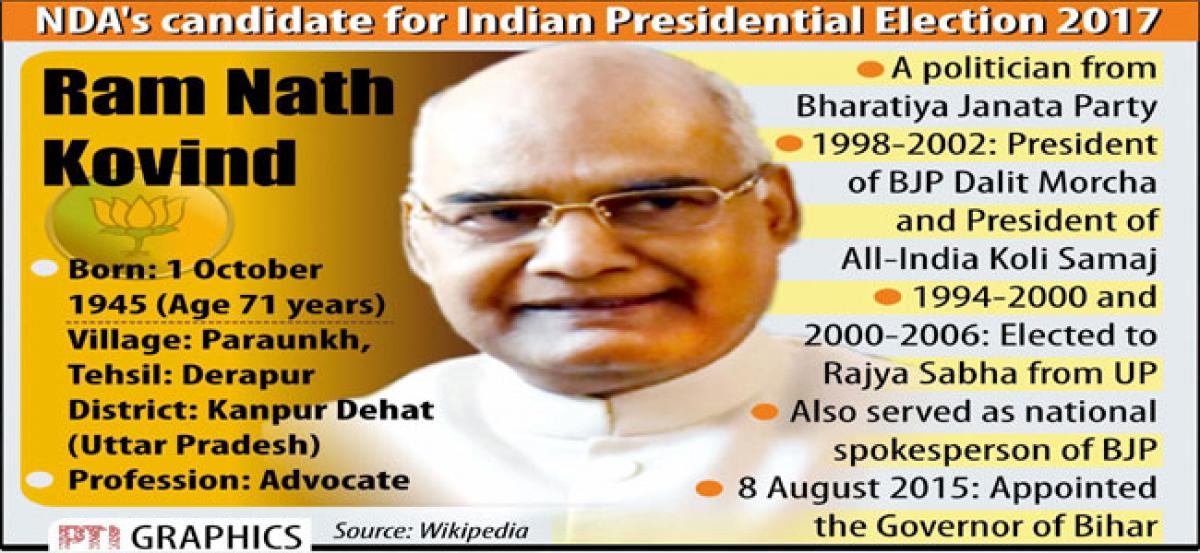Live
- A Guide to Temperature and Humidity Standards in Data Center Server Rooms
- Gadwal collector briefs on details of voters
- Jupally Krishna Rao takes part in Alampur rallu
- Bharath Prasad files 3rd Nomination
- Baisakh Month: A Time of Auspicious Beginnings and Sacred Festivals
- Oust BJD govt for overall development, says Shah
- Unveiling the Hidden Gems: Surprising Health Benefits of Garlic Peels
- Overcoming Sleep Struggles: A Comprehensive Guide to a Restful Night
- RTC bus hit the auto
- MLA Kuchukula Rajesh Reddy participated in the Birappa festival
Just In

His face doesn\'t grab airtime, his comments do not court controversy and his actions seldom make news. The National Democratic Alliance\'s man for the country\'s highest constitutional post is as low profile as can be.But Bihar Governor Ram Nath Kovind, 71, has attributes that not many in the large NDA family can boast of. The Kanpur-born former lawyer is a Dalit leader, is known for his organisatio
His face doesn't grab airtime, his comments do not court controversy and his actions seldom make news. The National Democratic Alliance's man for the country's highest constitutional post is as low profile as can be.But Bihar Governor Ram Nath Kovind, 71, has attributes that not many in the large NDA family can boast of. The Kanpur-born former lawyer is a Dalit leader, is known for his organisational skills and is a loyal member of the BJP.
Bihar Governor Ram Nath Kovind's links to the party's controversial Hindutva politics, however, are tenuous. Sources say he has been drawn more to the politics of social empowerment of Dalits and other weaker sections than the plank ofreligion
Names of several presidential probables from the NDA stable were doing the rounds but Kovind, a former national spokesperson of the party, was not among them. While the choice may have surprised political watchers, it's an astute move for a party working overtime to expand its social base and win over new constituencies.
Kovind, who could well be India's 14th president if the numbers stack up, is married and has a son and a daughter.
Kovind's links to the party's controversial Hindutva politics, however, are tenuous. Sources say he has been drawn more to the politics of social empowerment of Dalits and other weaker sections than the plank of religion.
Largely seen as an affable man, he has had a quiet innings as the governor of Bihar, a post that he took up in August 2015, months before assembly elections were held in the state.It is an acknowledgement of his non-confrontational conduct that Bihar Chief Minister Nitish Kumar, who has been battling the BJP in the state, lavished praise on him, saying he had done "exemplary work" as governor.
Kovind, a commerce graduate who also studied law at Kanpur University, practised in the Delhi High Court and the Supreme Court. He was also the Central government's standing counsel in the apex court from 1980-93.His official profile on the Bihar governor's website describes him as a crusader for "rights and cause of weaker sections of society specially Scheduled Castes/Scheduled Tribes/OBC/ minority..." from his student days.
The party's top brass would hope that by sending the only Dalit after K R Narayanan -- and the first from the Hindi heartland -- to Rashtrapati Bhavan, the BJP would win over the community. Kovind, who headed Dalit Morcha from 1998 to 2002, also led the All-India Koli Samaj.
Elected to the Rajya Sabha in April 1994 from Uttar Pradesh, he served two consecutive terms till March 2006. He joined a stir by SC/ST employees in 1997 when Dalits and others protested against orders issued by the Central government, which were rescinded by Atal Bihari Vajpayee when the NDA came to power.
As an advocate, Kovind took the lead in providing freelegal aid to weaker sections, especially the SC/ST women, and poor and needy girls under the aegis of the Free Legal Aid Society in Delhi.Known for his work in the field of education, he served as a member on the board of management of the Dr BR Ambedkar University, Lucknow, and was a member of the board of governors of the Indian Institute of Management, Kolkata.
Expressing surprise, West Bengal Chief Minister Mamata Banerjee claimed she has never heard of the nominee and termed it a "not so mature" move."I have not heard his name ever before. I do not know him. I could recognise him only after he was mentioned as the Bihar Governor. I can say that I am surprised by the decision," Banerjee said at Dubai en route the Netherlands to address a United Nations' event.
"His name did not come during our discussion. We gave a consensus proposal as the President is a very important portfolio. This name is like a bolt from the blue. This is not a very mature decision," she said.Terming the President's role as pivotal in protecting the nation and its Constitution, Banerjee argued that someone who is a seasoned expert in the subject should have been chosen instead.

© 2024 Hyderabad Media House Limited/The Hans India. All rights reserved. Powered by hocalwire.com







